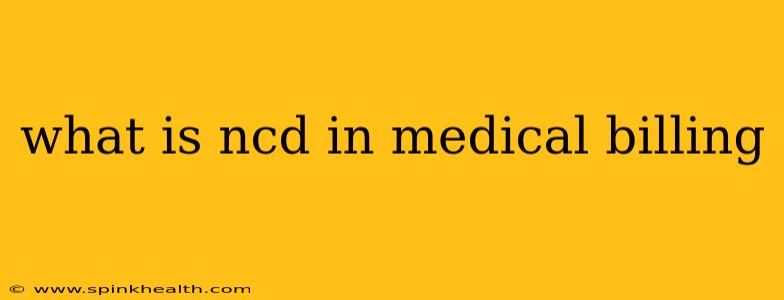Have you ever encountered the term "NCD" in the world of medical billing and felt a surge of confusion? You're not alone. Navigating the complexities of healthcare reimbursement can feel like deciphering a secret code, and understanding NCDs is a crucial step in that process. Let's unravel the mystery together.
Imagine this: a doctor orders a new, innovative procedure for a patient. The procedure seems promising, but the question remains: will Medicare, or another payer, cover it? This is where National Coverage Determinations (NCDs) step in. They act as the gatekeepers, defining whether a specific medical service or procedure is considered reimbursable under Medicare's national coverage policy. Think of them as the ultimate rulebook for what Medicare will pay for.
What Exactly Is an NCD?
An NCD is a formal decision made by the Centers for Medicare & Medicaid Services (CMS) that determines whether Medicare will pay for a specific healthcare service or technology nationwide. These aren't arbitrary choices; they're based on a thorough evaluation of scientific evidence, clinical effectiveness, and cost-effectiveness. CMS considers factors like the safety, efficacy, and overall value of the treatment before making a determination. This ensures Medicare resources are used responsibly and patients receive appropriate coverage.
Think of it like this: If a new medication or treatment is deemed medically necessary and beneficial based on robust evidence, CMS will likely issue an NCD providing nationwide coverage. Conversely, if the evidence is insufficient or the treatment is deemed experimental or ineffective, it might not be covered.
Who Makes These Decisions and How?
The decision-making process for NCDs isn't done in a vacuum. CMS involves various stakeholders, including medical experts, scientists, and representatives from healthcare organizations. They carefully review clinical evidence, analyze cost implications, and consult with other relevant parties to reach a balanced and informed decision. This ensures a comprehensive and well-reasoned approach to coverage determination.
How Do NCDs Affect Medical Billing?
NCDs directly impact how medical providers bill for services. If a service lacks an NCD or is explicitly excluded by an existing one, the claim will likely be denied by Medicare. Understanding NCDs is essential for healthcare providers to ensure accurate billing and avoid payment delays or denials. Accurate coding and billing are absolutely paramount to efficient reimbursement.
What Happens if There's No NCD?
The absence of an NCD doesn't automatically mean a service isn't covered. Medicare may still cover services on a case-by-case basis, or through other channels. However, it creates more uncertainty for providers and patients. It means additional documentation and justification are necessary to support reimbursement, which can increase administrative burden.
How Can I Find NCDs?
CMS makes NCDs publicly accessible. You can find them on the CMS website, where they are frequently updated to reflect advancements in medical science and technology. Searching for a specific procedure or service will typically reveal any relevant NCDs.
Are there other things that affect medical billing besides NCDs?
Yes, absolutely! NCDs are crucial, but they're just one piece of the puzzle. Other factors affecting medical billing include:
- Local Coverage Determinations (LCDs): These are made at a regional level by Medicare Administrative Contractors (MACs) and provide more granular coverage guidelines specific to a geographic area.
- Medical Necessity: Even with an NCD, a service may be denied if it's not deemed medically necessary for the individual patient. Documentation needs to explicitly demonstrate the medical necessity of the service or procedure.
- Correct Coding: Accurate use of medical codes is fundamental for proper billing and reimbursement. Incorrect coding can lead to denials, even if an NCD exists for the service.
Understanding NCDs, therefore, is not simply about navigating a complex reimbursement system; it's about ensuring patient access to appropriate medical care and responsible use of healthcare resources. By grasping the importance and implications of NCDs, both providers and patients can better navigate the healthcare landscape.

